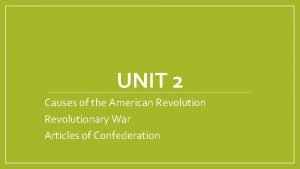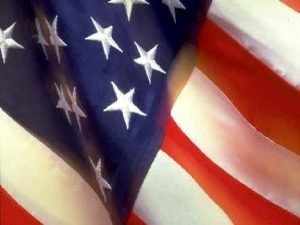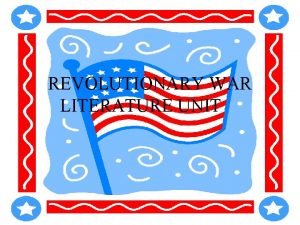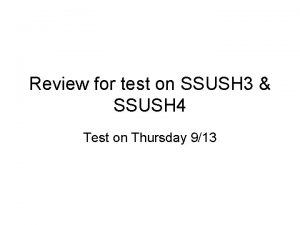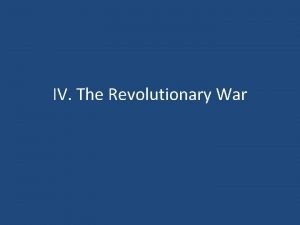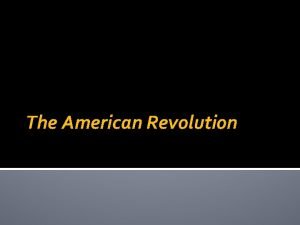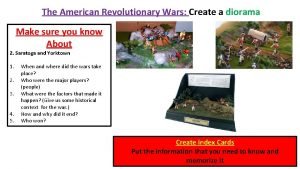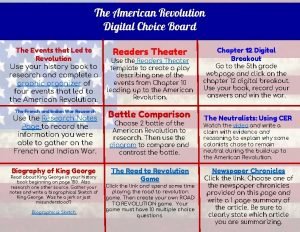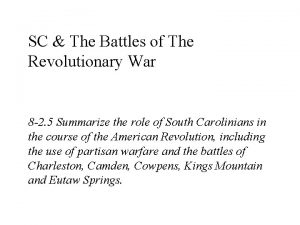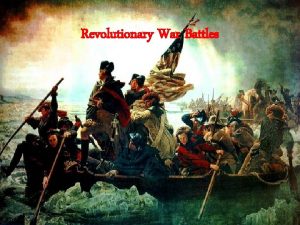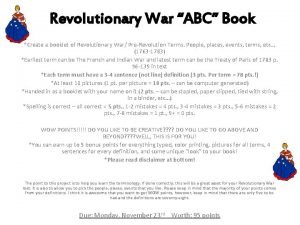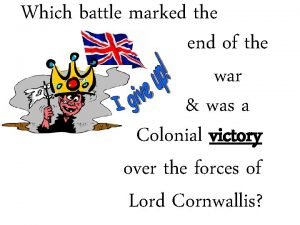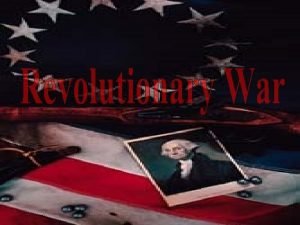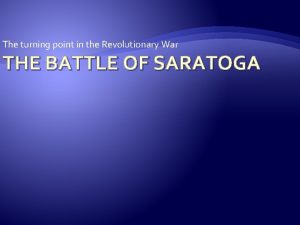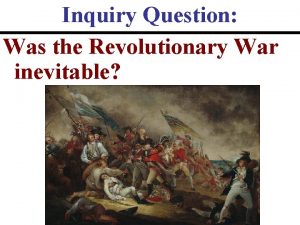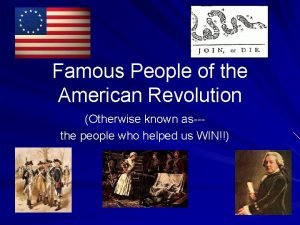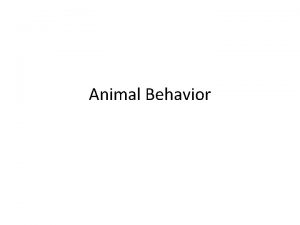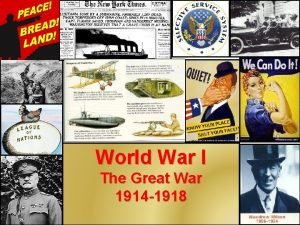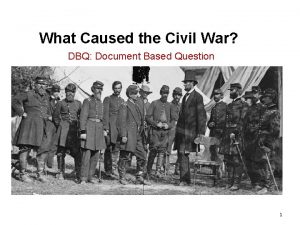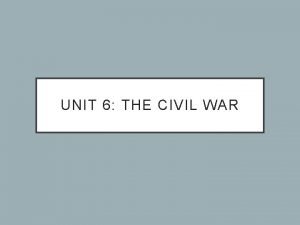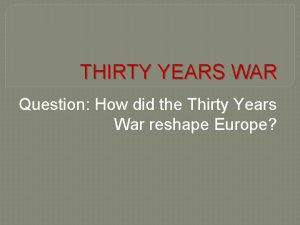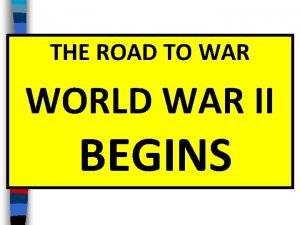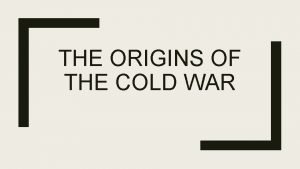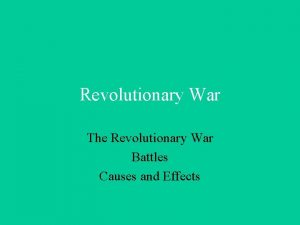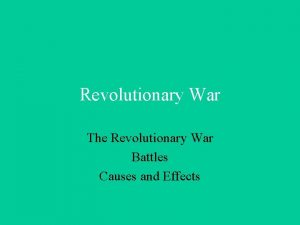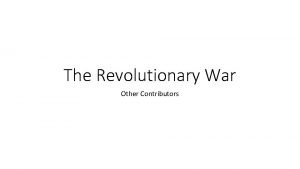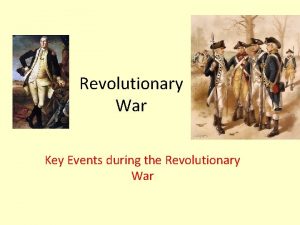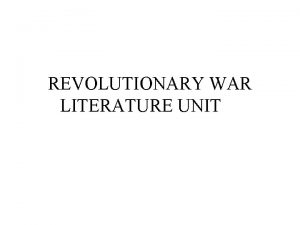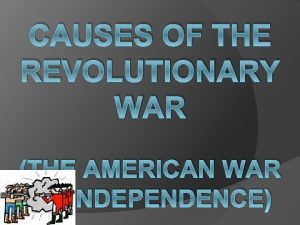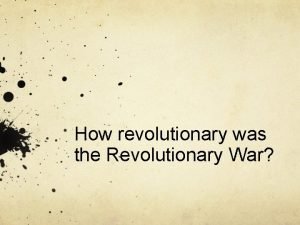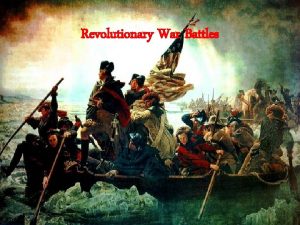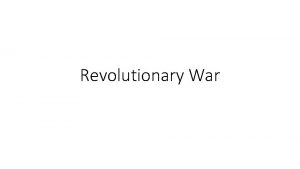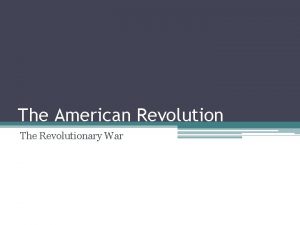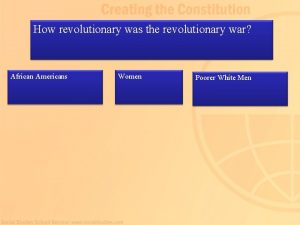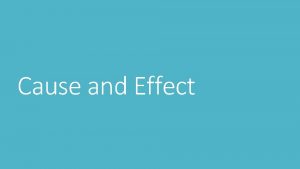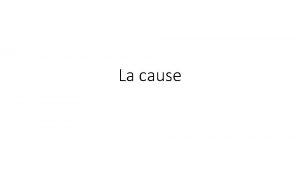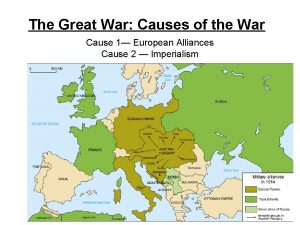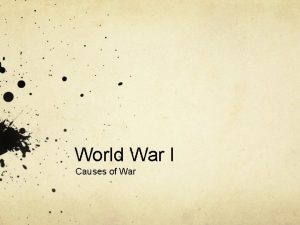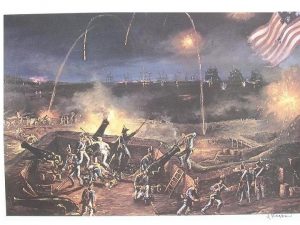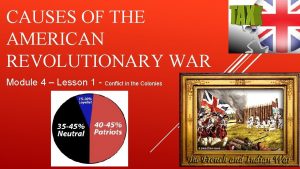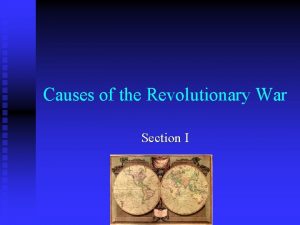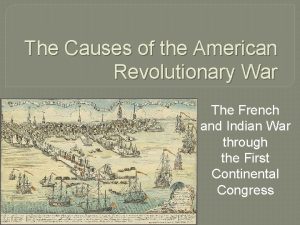Unit 2 Causes of the Revolutionary War Cause































- Slides: 31

Unit 2: Causes of the Revolutionary War


Cause #1: English Colonial Rule *The Navigation Acts 1651 -1673 n England like many other European nations started to follow theory of Mercantilism. n This meant that they were trying to build wealth by exporting more than they were importing.

Navigation Acts Cont. n n n Making $: Raw materials from colonies and colonists had to buy English manufactured goods. Describe: Couldn’t use foreign ships even if rates were cheaper. Could only send products to places in England’s Empire. Reaction: Colonists didn’t mind at first, but started to resent the restrictions. Some ignored the laws and started smuggling or trading illegally.

Cause #2: The French and Indian War. n n Both wanted control of the Ohio River Valley, the lands west of the Appalachian Mountains. Both sides began building forts in the Ohio River Valley. Because the French controlled the land they attacked and took a British fort and renamed it Fort Duquesne.

British and French Rivalry Cont. n n George Washington tried to take Duquesne back. Under his command they built Fort Necessity also taken by the French. Beginning of George Washington’s military career.

*Iroquois Confederacy n n n The French had more NA allies because of their Fur Trade. Most powerful group of Native Americans in the Northeast. Also, known as the 6 Nations The Iroquois Confederacy agreed to remain neutral between the French and British.

The Albany Plan n n Plan made up by Benjamin Franklin Called for a united Colonial Government. Failed: None of the colonies approved the plan. They were afraid to give up their own power. Didn’t unite the colonists against the French. Literary analysis questions?

*The French and Indian War Breaks Out. n The French enjoyed early success in the war fighting against mostly colonists west of the App. Mtns. And benefitting from the aid of Native American allies.

French and Indian War Cont. n n William Pitt-Military planner was sent over from England. He decided Britain would pay for the war and ran up tremendous debt. War ended when the British took the cities of Montreal and Quebec in Canada.

*The Treaty of Paris 1763 n n France had to give Great Britain Canada and most of its lands east of the Mississippi River. Spain received Louisiana and the port of New Orleans. The treaty marked the end of France as a power in North America and divided the continent between Britain and Spain.

Cause #3: The Proclamation of 1763 n French loss dealt blow to Native Americans in n the Ohio River Valley. They had lost their allies and trading partners. Britain raised the price of their goods. More British settlers were moving onto Native American lands.

3. Proclamation Continued n n Advantages for Britain: -Kept peace with Native Am’s -Kept colonists near the coast to keep trade flourishing. -Could keep control of App. westward expansion and the fur trade in the frontier. *Colonists resent troops and control of land by British. Pontiacs War: War between Pontiac (Ottawa Chief) and British Forts west of Mtns. and settlers. The Proclamation of 1763 stopped colonists from moving west of the Appalachian Mountains.

Cause #4: Taxation without Representation n n Britain had huge debt from the French and Indian War. They issued taxes on colonies and enforced existing tax laws more strictly to pay off their debt. Writs of Assistance-Legal documents that allowed customs officers to enter any location to search for smuggled goods.

*The Sugar Act n n n Parliament passed in 1764. It lowered the tax on imported molasses. It was an attempt to control smuggling. It angered the colonists because it took away the right to a jury trial in smuggling cases.

*The Stamp Act n n This was a tax on almost all printed material. It even included newspapers, wills and playing cards. Opposition: -Colonists that only their own assemblies should lay taxes on them.

Stamp Act Opposition Cont. Patrick Henry Persuaded the Virginia House of Burgesses to pass a resolution (a formal expression of opinion) declaring on the colonies could tax their citizens. n Quotes: “I’m not a Virginian, I’m an American” “…Give me liberty or Give me death!” n Samuel Adams n Started an organization in Boston called, “The Sons of Liberty”. n They led protests against the Stamp Act.

Stamp. Act Opposition Cont. n n n Other groups throughout the colonies protested by burning effigies (rag figures) representing tax collectors. Stamp Act Congress: 9 colonies met and drafted a petition to the king and Parliament. Colonists urged merchants to boycott (refuse to buy) British goods.

Stamp Act Cont. n n Parliament eventually repealed (cancelled) the Stamp Act. It was replaced with the Declaratory Act: stated that Parliament had the right to tax and make decisions for the British colonies “in all cases. ”

*The Townshend Acts n n They were a set of taxes that applied to imported goods such as glass, tea, and paper. The tax was paid when the goods arrived or the port of entry. Opposition: -Felt only representatives to Parliament should impose taxes on colonists. -Women organized groups called Daughters of Liberty. -They urged Americans to wear homemade fabrics and produce other goods they needed and not buy British goods.

Cause #5: The Boston Massacre. March 5, 1770 n n n Trouble began in Boston in 1768 Great Britain sent “Redcoats” after hearing colonists on the brink of rebellion. Set up camps in the center of the city. Mob instigated a violent encounter with British troops. How many colonists were killed? 5 Crispus Attucks-a dock worker was one of the colonists killed. (1 st casualty of the war)

Pictures

Pictures

Boston Massacre Continued n n Colonial leaders used the killings as propaganda (information made to influence public opinion). Samuel Adams put up posters calling the incident the Boston Massacre. n n n Paul Revere made an engraving showing the British troops firing on an orderly crowd. This led colonists to call for stronger boycotts of British goods. Eventually Townshend Acts repealed except Tea.


Cause #6: The Tea Crisis n n *Tea Act: Passed by Parliament in 1773 because the British East India Company was facing ruin. It allowed total control of the tea trade in America. Why mad still? Wanted to choose tea and there was still a tax! American merchants called for another boycott.

*Boston Tea Party n n n The Sons of Liberty organized a group, December 16, 1773. They dressed like Mohawk Indians and threw 342 chests of Tea into Boston Harbor. Tea Party Commercial 1, 2

Boston Tea Party Pictures

Boston Tea Party Pictures

Boston Tea Party Pictures

*Intolerable Acts (Coercive Acts) King George III realized England was losing control of the colonies. -Act was designed to punish the colonists. -Forced Bostonians to house British soldiers in colonists’ homes. (Quartering Act) -Town meetings were banned. -Closed Boston Harbor until the ruined tea was paid for. -Food and supplies couldn’t get in. -Colonists called the Coercive Acts the Intolerable Acts because they were painful and unbearable. n
 Causes of the american revolutionary war
Causes of the american revolutionary war Music of the revolutionary war
Music of the revolutionary war Revolutionary war literature
Revolutionary war literature Ssush
Ssush British weaknesses in the revolutionary war
British weaknesses in the revolutionary war Lemuel hayes revolutionary war
Lemuel hayes revolutionary war Boston tea party diorama
Boston tea party diorama American revolution readers theater
American revolution readers theater Kings mountain battle map
Kings mountain battle map Fort ticonderoga battle map
Fort ticonderoga battle map Abc revolutionary war
Abc revolutionary war Revolutionary war
Revolutionary war Revolutionary war british strengths and weaknesses
Revolutionary war british strengths and weaknesses Revolutionary war interactive notebook
Revolutionary war interactive notebook Which battle marked the end of the revolutionary war?
Which battle marked the end of the revolutionary war? British strengths during the revolutionary war
British strengths during the revolutionary war Turning point of the revolutionary war
Turning point of the revolutionary war Inquiry answer 12
Inquiry answer 12 Famous virginians
Famous virginians Famous people of the revolutionary war
Famous people of the revolutionary war Revolutionary war jeopardy
Revolutionary war jeopardy Proximate causation biology example
Proximate causation biology example Polygyny in animals
Polygyny in animals Ter thin client
Ter thin client Greylag goose egg-retrieval behavior
Greylag goose egg-retrieval behavior Imprinting biology examples
Imprinting biology examples What was the cause of world war 1
What was the cause of world war 1 What caused the civil war dbq
What caused the civil war dbq Sherman neckties
Sherman neckties Thirty years' war causes
Thirty years' war causes Ww2 causes
Ww2 causes What caused cold war
What caused cold war
